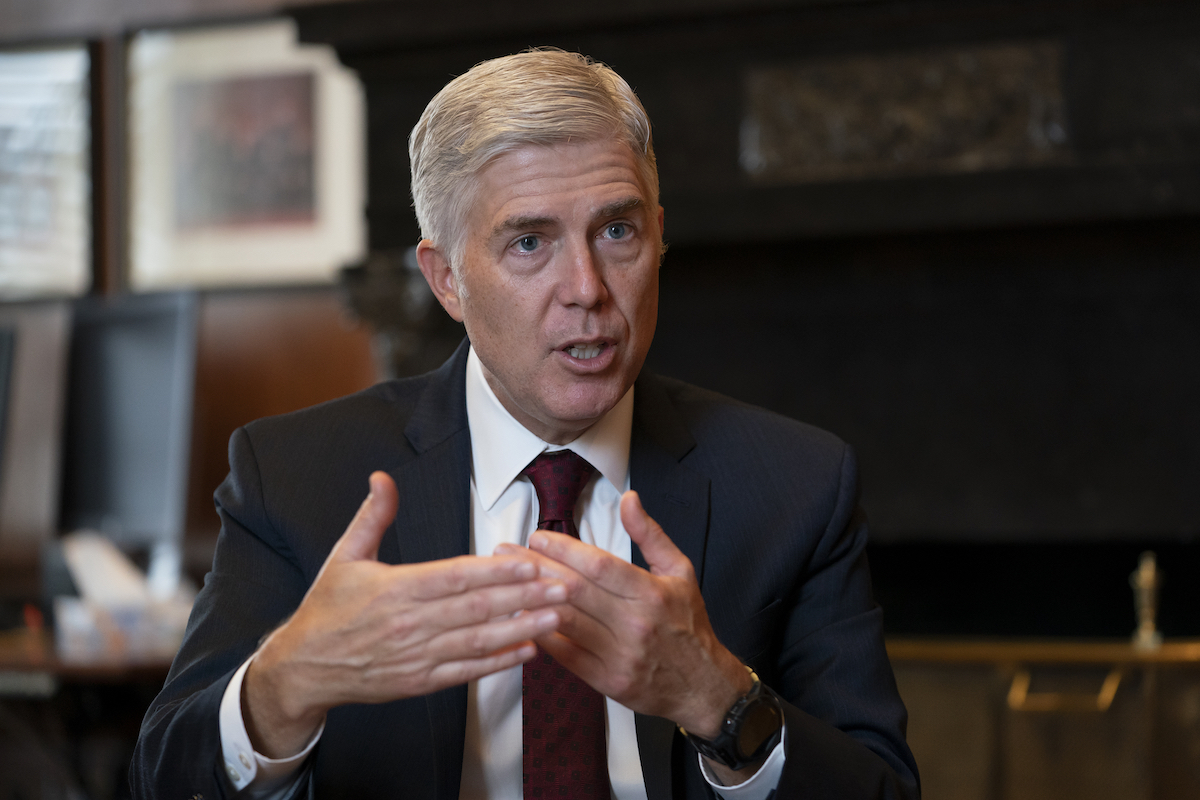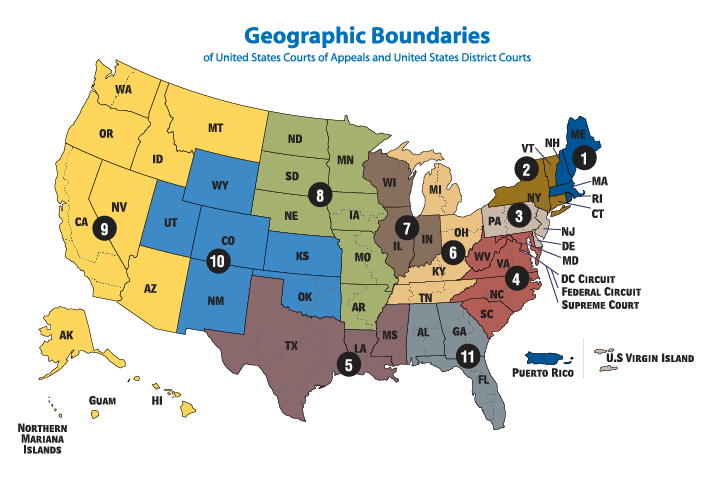Get PolitiFact in your inbox.

LGBTQ+ supporters wave a rainbow flag in front of the U.S. Supreme Court during oral arguments in Bostock v. Clayton County on Oct. 8, 2019, in Washington, D.C. (AP)
If Your Time is short
-
In 2020’s Bostock v. Clayton County decision, the U.S. Supreme Court ruled that discrimination on the basis of gender identity and sexual orientation is a form of “sex discrimination” prohibited in employment.
-
Since 2021, the Biden administration has directed federal agencies to incorporate that ruling into their policies. Some people opposed to these changes have sued federal agencies, including the U.S. Department of Education, questioning whether the Bostock ruling should be applied beyond employment.
-
Transgender rights advocates have also cited Bostock in their lawsuits challenging state laws they argue discriminate against transgender people. Circuit courts have issued mixed rulings, and a new case addressing transgender discrimination is likely to reach the Supreme Court.
This spring, multiple federal government agencies announced changes to antidiscrimination policies for LGBTQ+ people at work, at the doctor and in the classroom. Around the same time, a federal court ruled that restricting gender-affirming care and barring a West Virginia transgender student from playing girls’ sports violates antidiscrimination law.
Behind these policy and legal shifts is a 2020 Supreme Court case most people likely have never heard of: Bostock v. Clayton County.
Weighing cases in which employees said they were fired for being gay or transgender, the Supreme Court ruled in Bostock that firing people for their sexual orientation or gender identity amounts to "sex discrimination," which is prohibited under Title VII of the 1964 Civil Rights Act.
The landmark Bostock ruling’s impact on LGBTQ+ civil rights is proving significant. Here’s a crash course on the case, how it is shaping federal policy and being used to challenge legislation that aims to curb transgender rights.
Bostock v. Clayton County unpacked
In June 2020, as the world reeled from the coronavirus pandemic and nationwide protests against police brutality gripped the United States, the Supreme Court issued its 6-3 ruling in Bostock v. Clayton County. The ruling combined three Title VII lawsuits in which employees said they were fired because they were gay or transgender.
All three cases were "direct evidence" cases, said Jennifer Shinall, Vanderbilt University law professor. That means there was no dispute that the plaintiffs were fired for their LGBTQ+ identities; the question was whether that counted as illegal discrimination.
In a landmark ruling, the Supreme Court found that it did.
Neil Gorsuch, considered to be a "reliable conservative vote" on the Supreme Court, authored the majority opinion, joined by Chief Justice John Roberts and the four liberal justices on the bench at the time.

Justice Neil Gorsuch in his chambers at the Supreme Court in September 2019. Gorsuch wrote the majority opinion in Bostock v. Clayton County. (AP)
Gorsuch said the 1964 Civil Rights Acts’ authors likely did not consider LGBTQ+ identities when drafting the bill. But, he wrote, even if "sex" referred only to biological sex assigned at birth, "It is impossible to discriminate against a person for being homosexual or transgender without discriminating against that individual based on sex."
He gave an example he said shows such discrimination: A woman being attracted to men is tolerated, but a man being attracted to men is not. "An employer who fires an individual for being homosexual or transgender fires that person for traits or actions it would not have questioned in members of a different sex," Gorsuch wrote. "Sex plays a necessary and undisguisable role in the decision, exactly what Title VII forbids."
This ruling is binding precedent only for Title VII employment cases, and Gorsuch made it clear that it did not address questions beyond those narrow circumstances. Nevertheless, many LGBTQ+ advocates and legal experts saw potential for the same legal logic to be applied to other laws that prohibit "sex discrimination," such as Title IX, which prohibits sex-based discrimination in federally funded schools; the Affordable Care Act; and even the U.S. Constitution.
How the Bostock case is shaping federal policy
On his first day in office, President Joe Biden signed an executive order directing each federal agency to review and revise its policies to ensure they reflected the Supreme Court's reasoning in Bostock.
The Biden administration’s call to expand Bostock’s reasoning to other federal laws and corresponding policy drew criticism. Nevertheless, federal agencies including the Justice Department, Department of Agriculture, Equal Employment Opportunity Commission and the Department of Health and Human Services responded, releasing guidance, and in some cases, formal regulations clarifying that "sex discrimination" includes discrimination based on gender identity and sexual orientation.
The Education Department’s recently released regulations for Title IX are one of the most controversial changes. Title IX, passed in 1972, aims to protect students against sex discrimination and harassment in classrooms and school admissions. But it is best known for changing athletics to require that women and men receive equitable participation opportunities.
On April 19, citing the Bostock case, the Education Department updated its regulations to extend protections against sex discrimination to LGBTQ+ students. Although the regulations stopped short of providing guidance on the controversial issue of transgender athletes in school sports, the inclusion of LGBTQ+ identities under the nation’s leading gender-equity law prompted backlash.
House Speaker Mike Johnson, R-La., wrote on X about the rule change, "This expansion embraces radical gender theory & erases the protections women fought for."
Twenty-two state attorneys general have filed lawsuits challenging the new Title IX regulations. Some of those states have passed laws that potentially violate the new regulations.
Interpretations of Title VII and Title IX have often informed one another, said Shinall, the Vanderbilt University law professor. So, it’s not unusual that an interpretation of a term in one statute would affect the other.
But opponents are expected to argue that Bostock applies only in limited circumstances, and these changes overstep agencies’ policymaking authority.
"The bottom line is that the (Biden) Administration is interpreting Bostock more broadly than perhaps the (Supreme) Court will ultimately accept," Duke University law professor Doriane Lambelet Coleman told PolitiFact in an email.
Title VII is a general nondiscrimination rule, but other statutes, such as Title IX, make exceptions for single-sex accommodations such as sex-segregated living facilities and single-sex sports teams.
It’s unclear how the Supreme Court will apply Bostock’s logic to those statutory exceptions — such as whether barring a transgender girl from playing on a girls’ sports team is unlawful discrimination.
Issues of privacy, safety, fairness or equal opportunity could figure in deciding how nondiscrimination rules should apply beyond employment.
"I think that the margins of Bostock are going to be subject to a tremendous amount of litigation," said Elana Redfield, federal policy director at the Williams Institute, a think tank at the UCLA School of Law. "As the Biden administration continues to examine the applicability of Bostock in other contexts, that's going to provide new testing ground for the scope of the ruling."
How Bostock is being used in legal challenges to anti-trans laws
The Bostock case also has been cited by individual plaintiffs in lawsuits nationwide that challenge laws restricting transgender access to bathrooms, school sports teams and gender-affirming care.
Most recently, the U.S Court of Appeals for the 11th Circuit applied Bostock’s reasoning to a case in which a Houston County, Georgia, sheriff’s department employee alleged discrimination because the health insurance policy would not cover her gender-affirming surgery. The court ruled in her favor, writing, "Applying Bostock’s reasoning to the facts in this case, we conclude that the district court was correct in finding that the (policy) violated Title VII."
Other lower courts are also weighing whether Bostock’s reasoning applies to other federal laws that prohibit sex discrimination or the Constitution’s equal protection clause.
(Source: U.S. Courts)
Several circuit courts have found that Bostock’s LGBTQ+ protections apply to other federal statutes, and in some cases, the Constitution’s 14th Amendment equal protection clause.
Most recently, the U.S. Court of Appeals for the 4th Circuit ruled in both a school athletics case and a case about access to gender-affirming care that discrimination against transgender people constituted illegal discrimination under federal law, and in the case of health care, constitutional law.
But some circuit courts have decided differently. The U.S. Court of Appeals for the 6th Circuit, in the case LW v. Skrmetti, said Bostock was limited to Title VII and does not apply to the Constitution.
Most lawsuits make a two-part argument, alleging discrimination under federal laws such as the Affordable Care Act or Title IX, and that certain state laws violate the Constitution's 14th Amendment.
"In all of those cases to some degree, the question of Bostock’s applicability beyond Title (VII) is at issue" said Joshua Block, an attorney for the American Civil Liberties Union‘s LGBTQ & HIV Project. The ACLU is serving as legal representation for transgender plaintiffs in several of these cases.
The Supreme Court has declined in the past to review cases that wrestle with similar issues. But given the number of cases related to Bostock, and disagreement among the circuit court rulings, experts wonder if the Supreme Court will have to resolve the issue.
"The court is always more likely to take cases with clean facts that allow the court to only decide one issue and decide as narrowly as possible," Shinall said.
Our Sources
Email interview with Doriane Lambelet Coleman, Duke University law professor, May 6, 2024
Interview with Jennifer Shinall, Vanderbilt University law professor, May 3, 2024
Interview with Heron Greenesmith, deputy policy director at the Transgender Law Center, May 3, 2024
Interview with Rick Rossein, law professor at the City University of New York, May 6, 2024
Interview with Elana Redfield, federal policy director at the Williams Institute, May 6, 2024
Interview with Joshua Block, senior staff attorney for the ACLU's LGBTQ & HIV Project, May 7, 2024
Cornell Law School, "Bostock v. Clayton County," June 15, 2020
U.S. Supreme Court, "Bostock v. Clayton County," June 15, 2020
U.S. Equal Opportunity Commission, "Title VII of the Civil Rights Act of 1964," 1964
American Civil Liberties Union, "This Women’s History Month, Celebrate Title VII for Banning Sex Discrimination in the Workplace," March 9, 2016
Cornell Law School, "Price Waterhouse v. Hopkins," May 1, 1989
U.S. Equal Opportunity Commission, "Examples of Court Decisions Supporting Coverage of LGBT-Related Discrimination Under Title VII," accessed May 6, 2024
American Civil Liberties Union, "How the Impact of Bostock v. Clayton County on LGBTQ Rights Continues to Expand," June 15, 2022
White House, "Executive Order on Preventing and Combating Discrimination on the Basis of Gender Identity or Sexual Orientation," Jan. 20, 2021
Heritage Foundation, "Biden’s Executive Order on Gender Discrimination Has Muddied Waters on Title IX. Challenges Could Clear That Up," Feb. 19, 2021
Wall Street Journal, "Joe Biden’s First Day Began the End of Girls’ Sports," Jan. 22, 2021
Daily Signal, "Justices’ Title VII ‘on Basis of Sex’ Ruling Wreaking Havoc in Lower Courts," March 16, 2021
U.S. Department of Agriculture, "USDA Promotes Program Access, Combats Discrimination Against LGBTQI+ Community," May 5, 2022
U.S. Equal Opportunity Commission, "Enforcement Guidance on Harassment in the Workplace," April 29, 2024
U.S. Department of Health and Human Services, "Nondiscrimination in Health Programs and Activities," May 6, 2024
PolitiFact, "Here’s how new Title IX regulations could affect LGBTQ+ students," April 26, 2024
U.S. Department of Justice, "Title Ix Of The Education Amendments Of 1972," accessed May 6, 2024
X post, April 30, 2024
ABC News, "More GOP states challenge federal rules protecting transgender students," May 7, 2024
Movement Advancement Project, "Bans on Transgender People Using Public Bathrooms and Facilities According to their Gender Identity," accessed May 7, 2024
Movement Advancement Project, "LGBTQ Curricular Laws," accessed May 7, 2024
Congressional Research Service, "Potential Application of Bostock v. Clayton County to Other Civil Rights Statutes," July 2, 2021
U.S. Court of Appeals for the Fourth Circuit, "Grimm v. Gloucester," Aug. 26, 2020
U.S. Court of Appeals for the Seventh Circuit, "A.C. v. Metropolitan School District of Martinsville," Aug. 1, 2023
U.S. Court of Appeals for the Fourth Circuit, "B.P.J. v. West Virginia State Board of Education," April 16, 2024
U.S. Court of Appeals for the Fourth Circuit, "Kadel v. Folwell," April 29, 2024
U.S. Court of Appeals for the Eleventh Circuit, "Paul Eknes-Tucker, et al. v. Governor of the State of Alabama, et al," Aug. 21, 2023
U.S. Court of Appeals for the Eleventh Circuit, "Adams v. School Board of St. Johns County, Florida," Dec. 30, 2022
U.S. Court of Appeals for the Sixth Circuit, "L.W. v. Skrmetti," Sept. 28, 2023
U.S. Court of Appeals for the Ninth Circuit, "Hecox v. Little," Aug. 17, 2023
The 19th, "Where does the Supreme Court stand on gender-affirming care bans?," May 2, 2024
The Washington Post, "Court says state health-care plans can’t exclude gender-affirming surgery," April 29, 2024
The Associated Press, "West Virginia's and North Carolina's transgender care coverage policies discriminate, judges rule," April 29, 2024
The Washington Post, "Biden moves to reinstate health protections for LGBTQ Americans," July 25, 2022
The Washington Post, "Biden calls for LGBTQ protections in Day 1 executive order, angering conservatives," July 21, 2021
USA Today, "Fact check: Biden executive order on discrimination in women's sports," Feb. 14, 2021
CNN, "Biden administration restores protections for gay and transgender Americans seeking health care," April 27, 2024
NBC News, "EEOC says workplace bias laws cover bathrooms, pronouns and abortion," April 30, 2024
Ballotpedia, "Neil Gorsuch," accessed May 9, 2024
Sports Illustrated, "50 Years of Title IX: How One Law Changed Women's Sports Forever," May 19, 2022
U.S. Department of Education, "FACT SHEET: U.S. Department of Education’s 2024 Title IX Final Rule Overview," April 19, 2024
Congress.gov, "Fourteenth Amendment," accessed May 8, 2024
U.S. Department of Education, "U.S. Department of Education Releases Final Title IX Regulations, Providing Vital Protections Against Sex Discrimination," April 19, 2024
U.S. Department of Justice, "Application of Bostock v. Clayton County to Title IX of the Education Amendments of 1972," March 26, 2021
American Civil Liberties Union, "Opening Brief of Plaintiff in B.P.J. v. WV," March 27, 2023
Reuters, "US Supreme Court sidesteps fight over transgender student bathroom access," Jan. 16, 2024
American Civil Liberties Union, "U.S. Supreme Court Declines to Hear Challenge to Title IX Victory for Transgender Rights," Jan. 16, 2024
U.S. Court of Appeals for the Eleventh Circuit, "Lange v. Houston County, Georgia," May 13, 2024
NBC News, "Mississippi enacts transgender bathroom ban in public schools," May 13, 2024
NBC News, "Over 20 GOP-led states sue Biden administration over Title IX rules for LGBTQ students," May 8, 2024
U.S. District Court Northern District Alabama Western Division, "Title IX regulations complaint - Alabama, Florida, Georgia, South Carolina," April 29, 2024
U.S. District Court Northern District of Texas Amarillo Division, "Title IX regulations complaint - Texas," April 29, 2024
U.S. District Court Eastern District of Kentucky Covington Division, "Title IX regulations complaint - Kentucky, Indiana, Ohio, Tennessee, Virginia, West Virginia," April 30, 2024
NBC News, "Five Republican-led states sue over Biden's new Title IX transgender protection," April 29, 2024
U.S. District Court Western District of Oklahoma, "Title IX regulations complaint - Oklahoma," May 6, 2024
U.S. District Court Eastern District of Missouri St. Louis Division, "Title IX regulations complaint - Missouri, Arkansas, Iowa, Nebraska, North Dakota, South Dakota," May 7, 2024
Louisiana attorney general, "Louisiana Attorney General Liz Murrill Files Lawsuit," May 3, 2024































